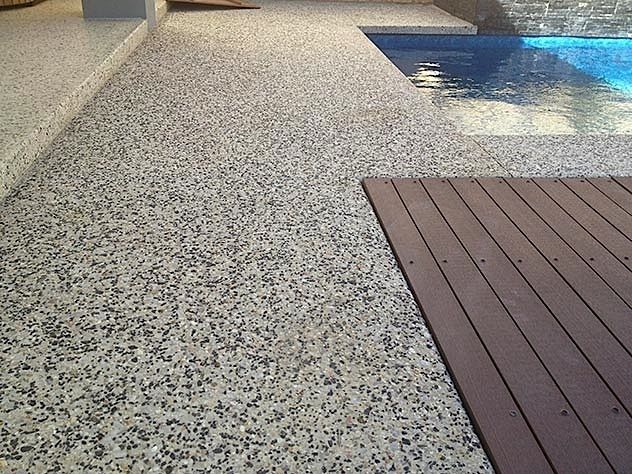Cleaning the concrete and paving in Thailand

With the wet season comes the rain. And with the rain, plus the ongoing hot weather, mould and algae growing on all our outdoor walls and paving.
Rain + algae + mould looks awful and can be very slippery. Stains can also make your investment look old and unwanted. Black mould can cause allergies for some people
You have two choices. Maintain them yourself or get someone in to do it for you. If you would like to save a few baht and do it yourself here are a few proven methods.
Before you even start a few warnings. Don’t use any of these cleaning methods on a large area before you’re completely sure it’s going to work. Try out your chosen method on a small area first to check that it won’t harm the surface and that it actually does the cleaning you expect.
Also, ask around. Many houses in Thailand have concrete, aggregate, paving and tiling outside so we all have the same problems. See what’s worked with others around your area. Also be aware some of the chemicals can be dangerous for you and for the environment. There’s plenty of alternatives these days that are safe and effective.
Whilst there is no magic solution, keeping up regular maintenance is your best answer. Doing a quick, regular clean is going to be a lot easier than, say, an annual clean where it just becomes a lot of hard work, or expense. And messy.
Before you do anything else move all the furniture away, clear the area and make sure any weeds are removed before starting.
Bleach
Beach will remove stains from practically anything. Since pavers and aggregate surfaces are mostly made of concrete, bleach can be a good way to remove stains, black mould and algae from them, if used correctly.
Diluting the bleach is extremely important if you want to protect the color of your patio or driveway. Mix half a cup of bleach with around 5 cups of water, and add a spoonful of dish-washing liquid to it. Bleach is quite dangerous and shouldn’t get in contact with your skin. Wear gloves. It’s also generally toxic for plants so don’t use it around lawns or garden beds.
Spray this using a spray bottle on the surface and let it soak in for 15-20 minutes depending upon how dirty the surface is. A little bit longer for stubborn stains and really long-term build ups of mould.
Scrub the pavers with a brush that has nylon or natural bristles. Rinse off the solution with water – high-pressure water cleaner will add some muscle to the chemical reaction. Let your pavers dry in the heat.
Chlorine
Yeah, the stuff they put into your swimming pool to keep it free of nasty bacteria and the water clean. Chlorine can also be used to clean your patio or driveway, especially the black mould, moss and algae.
Mix chlorine and water (10% chlorine, 90% water) in a spray bottle. Spray the mixture on the paving thoroughly and evenly, and let it soak in for 10-30 minutes minutes. Follow up with scrubbing the pavers to remove any excess dirt or particularly stubborn stained areas. like with the bleach, use gloves and protect your skin from coming into contact with the chlorine. Also make sure that you’ve got good ventilation around the area (your very probably outside anyway).
Chlorine is toxic for you and your plants. If it splashes on your clothes you’ll most likely get bleached splotches so don’t wear your latest Armani purchase whilst using chlorine (same with the full-strength bleach).
Vinegar (acetic acid)
It stinks but vinegar is one of the best choices you could make to clean your concrete pavers and paving. It’s non-toxic and a better alternative around pets and kids.
Spray full-strength vinegar using a spray bottle on the affected parts of the patio or driveway. Let the vinegar soak in completely – say a good 60 minutes or so. Then spray the paving with a mixture of soap and water and scrub with a brush to remove any dirt that may have been overlooked by the vinegar.
Better to use white vinegar as it doesn’t stain.
Soap and Water
This simple combination of soap and water is a safe, reliable combination but needs a little ‘elbow grease’ or mechanical assistance to get the same results.
Start off with a high-pressure washer. Use this first to remove the worst of the stains, mould and algae. Then apply the detergent and water and scrub the rest by hand. Doing this removes the rest of the grunge and goo. These magic machines will blast off just about any mould, mildew or moss. WARNING: Don’t put your hands or anybody else close to the high-pressure stream of water and air!
With high pressure cleaners, at this stage, we haven’t found any places where you can rent these units for an afternoon. But, if you’re going to be doing regular cleaning yourself the investment is quite reasonable – you can pick up a fairly good one for 5,000 baht. They’re always on display near the front of most Home Pro or Thai Watsadu stores. Better still, ask the neighbour if you can borrow theres and buy them a nice bottle of wine as a thank you 🙂

A few other things
For fresh oil or grease stains use baking soda and apply it to the stains. Leave it for a good hour. Remove the baking soda then apply again of the oil or grease stains are bad.
There’s nothing better than regular cleaning. Even if you just regularly sweep the pavers, or spray them with water, it will help prevent the spores settling and starting to grow.
Once all bright and shiny consider using a paving sealer. They are readily available, easy to apply and make the cleaning a lot easier as the spores, grunge and dirt won’t sink into the porous paving surface.
Try one, try all methods. Tell us which works best or any other methods you’ve tried with success or the ones that have been a complete failure.
Join the conversation and have your say on Thailand news published on The Thaiger.
Thaiger Talk is our new Thaiger Community where you can join the discussion on everything happening in Thailand right now.
Please note that articles are not posted to the forum instantly and can take up to 20 min before being visible. Click for more information and the Thaiger Talk Guidelines.
Leave a Reply
You must be logged in to post a comment.









